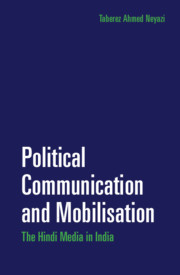Book contents
- Frontmatter
- Dedication
- Contents
- List of Figures, Tables and Maps
- Preface
- Acknowledgements
- Chapter 1 Introduction: Political Communication and Mobilisation in India
- Chapter 2 Under Colonial Rule: Mobilisation in the Hindi and English Press
- Chapter 3 Media and Mobilisation in Independent India
- Chapter 4 Localisation, Grassroots Mobilisation and Hindi News Media
- Chapter 5 Political Economy of the Hindi Press
- Chapter 6 The Hybrid Media System, Anti-corruption Movement and Political Mobilisation
- Chapter 7 Agenda-setting and Mobilisation in a Hybrid Media Environment
- Chapter 8 Conclusion: Politics, Power and Mobilisation in Digital India
- Bibliography
- Index
Chapter 8 - Conclusion: Politics, Power and Mobilisation in Digital India
Published online by Cambridge University Press: 17 August 2019
- Frontmatter
- Dedication
- Contents
- List of Figures, Tables and Maps
- Preface
- Acknowledgements
- Chapter 1 Introduction: Political Communication and Mobilisation in India
- Chapter 2 Under Colonial Rule: Mobilisation in the Hindi and English Press
- Chapter 3 Media and Mobilisation in Independent India
- Chapter 4 Localisation, Grassroots Mobilisation and Hindi News Media
- Chapter 5 Political Economy of the Hindi Press
- Chapter 6 The Hybrid Media System, Anti-corruption Movement and Political Mobilisation
- Chapter 7 Agenda-setting and Mobilisation in a Hybrid Media Environment
- Chapter 8 Conclusion: Politics, Power and Mobilisation in Digital India
- Bibliography
- Index
Summary
The diversity and complexity of the Indian media is clearly reflected in the ways in which Hindi media operated and continue to operate in this comparatively young democracy by treading a complex space and influencing social and political mobilisation. By aligning themselves with the freedom struggle against the British, Hindi newspapers were able to establish themselves as a significant vehicle for political communication during the colonial period. The battle for public opinion took new turns after independence because the power equations between the vernacular press and the English press had altered. The findings in this book suggest that Hindi media is not a homogenous entity – neither in the past nor in contemporary contexts – in terms of its internal politics, ideological perspective and market influence. The Hindi media played an important role in the political and social mobilisation beginning in the 1980s in addition to exploding caste, regional and religious identities. The shifting focus of politics from the centre to the regional levels since the 1980s would not have been possible without the rise of the regional public sphere mediated in the vernacular languages, including Hindi. The Hindi media consolidated its position within Indian politics and society by acting as an agent of mobilisation and helped mediate local voices within the larger macro-institutions, which aided in the development of more productive interactions between the elite and the mass public. Political mobilisation mediated by the Hindi news media reflects the ongoing conflicts among various actors who want to wield power and influence public policies.
The binary between the Hindi and English media, if not completely disappearing, is becoming increasingly blurred. The political significance of the Hindi media was previously established, with political leaders not shying away from giving exclusive interviews to Hindi press and news channels. Certain journalistic practices that are embedded within the transorganisational field of journalism practices such as the objectivity and professionalism often associated with English media are now observed in Hindi media organisations.
The changes occurring in the media environment with the arrival of the internet have created a new era in the ways content flows have been taking place across different platforms, affecting both Hindi and elite English media.1 This trend resulted in the emergence of a hybrid media system and has made it difficult to understand the functioning of a particular medium in isolation.
- Type
- Chapter
- Information
- Political Communication and MobilisationThe Hindi Media in India, pp. 186 - 196Publisher: Cambridge University PressPrint publication year: 2017



